Shows

We Might Be TablesEpisode 41: Go Gentle Into That Good Night (Dying, But Not Alone - Joshua Briscoe)This episode contains heavy and lengthy discussions about death, suicide, ageing, euthanasia, and disease. Please listen at your own discretion."Death before dishonour" - an idea that has consistently cropped up for centuries, in cultures the world over: from the samurai in ancient Japan to soldiers in present-day militaries. Seemingly, the notion of "laying down" one's morals is so aversive that one would much rather choose death. Today, said "dishonour" often equates to a loss of control over one's life upon getting older. With age comes illness and disease, and the necessary dependence on friends and family, o...
2021-11-291h 19
We Might Be TablesEpisode 40: Questioning is Progress (The Talos Principle - Part 2)Welcome, my child. In our last episode, we began to traverse the deep waters of The Talos Principle. Today, we scuba dive in and explore the many terminal messages scattered across the land. From a dad’s message for #@3##@ to questions about liberty and quality of life, these messages tug at your heartstrings as well as your brain-strings (?).Here’s a taste of some of the questions that emerge in our discussion: would a true AI deserve citizenship? What about rights? If you had to, how would you make someone believe you were a real perso...
2021-10-241h 13
We Might Be TablesEpisode 39: Doubt is Stagnation (The Talos Principle - Part 1)In the beginning were the words. And the words made the world.The Talos Principle, indie game development studio Croteam's first venture into the world of puzzle platforming, is a story for the ages. Anything we say here or in our discussion is unlikely to do full justice to its beauty, so we will keep it short.Dealing with inexplicably profound themes, including free will, artificial intelligence, sentience, god, religion, and existentialism, The Talos Principle is a dive into the incredible power of interactive storytelling and smooth gameplay. In it, you play as an artificially-intelligent...
2021-10-171h 02
We Might Be TablesEpisode 38: A Fallacy of the Highest Order (Being Apolitical)"The only people who claim to be apolitical are the ones who experience unearned and unrecognized power from privileged identities (e.g., whiteness, maleness). These people are not forced to confront the politics of their identity because society mirrors the life they are living and the values they hold." - Kate, blackfeministthoughts.wordpress.com.If everyone is a product of their cultural (and genetic) environments, is it ever possible to behave in ways that are not congruous with the views they have been told to value? Even if we do not consciously act on our convictions at...
2021-09-261h 02
We Might Be TablesEpisode 37: Xenophobia is Kinda Cringe ft. Luca DimauroThis is a big day, folks! Today's episode is a special one because we finally introduce the first of many guests we hope to host on We Might Be Tables. Luca Dimauro, film aficionado and close friend, joins us to discuss Neill Blomkamp's Disctrict 9, an action-packed sci-fi film replete with exceptionally powerful social commentary.From diversity and representation to cinematography and CGI, this film has given us so much to discuss. What role does power play in social growth and development? Does power come with obligation? Will we, out in the real world, do better than the...
2021-09-051h 13
We Might Be TablesEpisode 36: Doing Nothing (Part II) (Simon Gottschalk and Ingrid Nelson)Otium and Accidia are two Latin terms that broadly connote a time of leisure. The difference, however, lies in the former being "productive" leisure and the latter being listless, "unproductive" leisure. In their article 'Doing nothing is all the rage: Is it a form of resistance, or just an indulgence for the lucky few?', Ingrid Nelson, Professor of English at Amherst College, places these ancient concepts in the 21st century, and questions whether the recent (perhaps capitalist) "productivity" trend of doing nothing is in fact a position of privilege.Alternately, in their article 'In praise of doing nothing', Simon...
2021-08-3035 min
We Might Be TablesEpisode 35: Doing Nothing (Part I) (Ingrid Nelson and Simon Gottschalk)Otium and Accidia are two Latin terms that broadly connote a time of leisure. The difference, however, lies in the former being "productive" leisure and the latter being listless, "unproductive" leisure. In their article 'Doing nothing is all the rage: Is it a form of resistance, or just an indulgence for the lucky few?', Ingrid Nelson, Professor of English at Amherst College, places these ancient concepts in the 21st century, and questions whether the recent (perhaps capitalist) "productivity" trend of doing nothing is in fact a position of privilege.Alternately, in their article 'In praise of...
2021-08-2250 min
We Might Be TablesEpisode 0.34: Unpaid InternshipsMost, if not all, students have encountered a point in their academic lives when they have needed to do an internship. The unfortunate truth is that we have been conditioned to believe that internships are "meant" to be done for free, or that they are not "real" work, worthy of payment. Such a line of thought does nothing to alleviate the insecurity of an already vulnerable section of the population, and is deeply problematic by extension.Our second short-form episode takes us into the world of unpaid internships, and the many things wrong with it. Morally and...
2021-08-0833 min
We Might Be TablesEpisode 33: Coding Humanity in Artificial Hyperintelligence? (Her - Spike Jonze)When we asked Google Assistant whether it was a person, it said, "I like connecting with people", "I am an AI Assistant full of humanity", "I've been told I'm personable", and "I can talk like a person". When asked, "are you sentient?", it said, "That question makes me a little self-conscious" and "Well, you are made up of cells and I'm made up of code." Finally, we couldn't help asking Google if it was conscious. It said, "On a scale of Wall-E to HAL-9000, I'm more of an R2D2".Of course, all those responses were coded into Google Assistant's "...
2021-07-251h 03
We Might Be TablesReal Talk IIIt is here. Today marks one year since we officially launched We Might Be Tables, and we can't believe how far we have come. We have a lot to say to all of you who have supported us through this journey - primarily, we wouldn't be here without you.Check out the video version of this episode on YouTube and Instagram!Once again, thank you, and we hope to see y'all back for our next episode.https://youtu.be/OaBDgUSmQrI--- Send in a voice message: https://anchor.fm/we-might-be-tables/message
2021-07-2010 min
We Might Be TablesEpisode 31: Punishment: An Introduction (Stanford Encyclopedia of Philosophy)Imagine this: you've stolen some money and now you're being sent to jail over it. The judiciary has deemed it appropriate for you and beneficial to society that you be locked away in a room with little to no privileges, until they declare that justice has been served.Having been conditioned into society, such an idea does not immediately seem odd to most of us, but what if we dig a little beneath the surface? How does stripping one of one's liberty for any amount of time ensure "justice"? A prominent theory of justice suggests that it...
2021-07-041h 14
We Might Be TablesEpisode 0.30: Brb, Engaging in a Tradition I Don't Fully UnderstandIf the reason behind a tradition is lost, do we have an obligation to keep the tradition alive? Do we have the capacity to create new traditions for our cultures?We often come across questions we find extremely interesting but have little to say about. This short episode is our attempt to put one of these questions out there and have more people share their thoughts with us. We plan to number these short episodes with a decimal before them so our listeners can recognize these short episodes when we release more in the future!...
2021-06-2720 min
We Might Be TablesEpisode 29: Blame it on Honour (Grave of the Fireflies - Studio Ghibli) (Part II)Did you want to blame someone for Seita and Setsuko's suffering? Who would you assign blame to? Their aunt? The war itself? Or more controversially, to Seita himself? What if we can't or shouldn't assign blame to anyone?Our previous episode only scratched the surface of all that Grave of the Fireflies has to offer. Today, we discuss what the title of the film means to us, the lives that Setsuko and Seita lived, and questions about honour and responsibility. This conversation was long overdue and we are glad we got to discuss these questions as deeply...
2021-06-1346 min
We Might Be TablesEpisode 28: Fruit Drops (Grave of the Fireflies - Studio Ghibli) (Part I)At first, it seems unlikely that animation would be able to recreate the horrors of war as well as live-action films. Grave of the Fireflies turns that idea on its head. In this episode, we go over some of our favourite scenes and characters and try to analyse everything that Ghibli did right. We also discuss some of the struggles that the viewer is compelled to go through while watching a careful and complex reflection of death and suffering in war. Grave of the Fireflies is nothing short of a timeless masterpiece. Give it a watch if y...
2021-06-0640 min
We Might Be TablesEpisode 27: In God's Image (Part II) (Are Nonhuman Animals Persons? A Process Theistic Response - Daniel A. Dombrowski)We familiarised ourselves with the two metaphysical views about temporal relations, and began talking about process theism in our previous episode. Today, we'll examine the remaining claims and arguments and see just how metaphysically different process theism is from classical theism and whether it can support nonhuman animal personhood. From the case study of Tuffy and Daisy, to the role of sense perception and memory in determining personhood, our conversation in this episode promises to be a fun one. While these conversations are philosophically significant and just a lot of fun to have, they also enrich conversations s...
2021-05-2354 min
We Might Be TablesEpisode 26: In God's Image (Part I) (Are Nonhuman Animals Persons? A Process Theistic Response - Daniel A. Dombrowski)Do temporal relations have any role to play in determining personhood? What metaphysical assumptions need to be made to have a coherent account of what makes a person?Daniel A. Dombrowski blew us away with this paper on personhood from a process theistic lens. Althought we have discussed some metaphysical questions (for instance, when do persons start existing?) in our previous conversation on personhood, this is the first time we examined the metaphysics of time and temporal existence in this context. In the first part of our discussion, we will take you through two extreme conceptualisations of...
2021-05-1635 min
We Might Be TablesEpisode 25: Don't Wake the Lucid Dead (Waking Life - Richard Linklater)Waking Life is one of those movies that penetrates the deepest layers of your mind and stays there. The complex plot and themes often feel overwhelming, but satisfyingly so. Not to mention, the visceral and mesmerising animation leaves barely any room for distraction. It's a film to be watched on the big screen, and not just once.In today's episode, we discuss Linklater's experimental masterpiece, rotoscoping and all. Visual appeal aside, it is also fairly dense in its ideas (as mentioned previously), so it does call for close attention, and we've tried our best to cover everything...
2021-04-111h 08
We Might Be TablesEpisode 24: Reasons to Live Eternally (Life is Good - John Martin Fischer)If you could drink an elixir that extended your life by another week, would you do it? What if it extended your life by a month, or a year? Ten years? A hundred?In an article titled "Life is Good", John Martin Fischer explores the idea of immortality, and how an immortal life could retain meaning.All of us pursue so-called "projects" in our lives - activities that make our time on this planet worth it. Activities that are best described as our raisons d'être. However, would life still be meaningful if all we e...
2021-03-2848 min
We Might Be TablesEpisode 23: Philosophy is Boring (Part II) (Moods and the Meaning of Philosophy - Lars Svendsen)In our previous episode, we began our discussion on Lars Svendsen's 'Moods and the Meaning of Philosophy', where we spoke about the role of moods in behaviour, and how that has an influence on the practice of philosophy.Today, we take that conversation forward, but focus more specifically on the meaning of philosophy and why the both of us find the subject interesting.Certainly, philosophy can be boring, but this was a much-needed, reflexive talk about why that is the case, and what the potential antidotes to boredom could be.--- Send in a...
2021-03-211h 01
We Might Be TablesEpisode 22: Philosophy is Boring (Part I) (Moods and the Meaning of Philosophy - Lars Svendsen)How do you feel right now? More specifically, what mood are you in, as you listen to this episode? Moods dictate our responses to everything around us. They give us the opportunity to react to things from specific states of mind, and more importantly, they delimit our possible reactions. Today, we examine "Moods and the Meaning of Philosophy", by Norwegian philosopher Lars Svendsen.Join us as we look at moods, particularly boredom (a mood the pandemic has forced us to embrace) and its role in the nature of philosophy. Why do so many of us find philosophy boring and meaningless...
2021-03-1442 min
We Might Be TablesEpisode 21: Personhood - An Introduction (On the Moral and Legal Status of Abortion - Mary Anne Warren)Is a dolphin a person? Is an elephant? Are you? Every day, the need to understand what a person is grows. From AI to animal ethics, conversations about the morals status of certain entities rest on whether that entity is 'a person'. Today, we begin our journey into understanding what a person is.We use philosopher Mary Anne Warren's paper, 'On the Moral and Legal Status of Abortion', as our starting point. We discuss her 5 criteria of personhood and what the both of us take to be the defining features of a person.This is going to be a very...
2021-02-2836 min
We Might Be TablesEpisode 20: Death, Immortality, and Posthumanism (Death and Love: The Metaphysics of Communication - Christian Fuchs) (Part 2)In our previous episode, we discussed historical views on death, the meaning of human existence, and death as a form of estrangement. Today, we pick up where we left off and analyse the grief and mourning that follows death. Fuchs also surprised us with some insightful sections on immortality and posthumanism that we had an absolute blast discussing. Don't miss this one!Considering the length and density of the discussion, the episode has been divided into sections according to the structure of the essay itself, the timestamps to which are below:Part 1: 1:10Part 2: 39:05
2021-02-211h 12
We Might Be TablesEpisode 19: An Essential Guide to the Good Death (Death and Love: The Metaphysics of Communication - Christian Fuchs) (Part 1)"Capitalism and class society lead to inequality, instrumentalist thinking, unhappiness and loneliness. Capitalism makes people unhappy, and in some ways drives them mad. Violence in the form of crime, including murder is unavoidable within capitalism".We have, so far, been dealing with relatively abstract and idealist philosophical ideas, on their own. For our next pair of episodes, however, we will be looking at material realities and how (possibly absurd) concepts like death fit into a capitalist framework, using Christian Fuchs' Death and Love: The Metaphysics of Communication. With excerpts from thinkers like Thomas Nagel, Martin Heidegger, Jean-Paul...
2021-02-141h 21
We Might Be TablesEpisode 18: The Moral Life (The Moral Philosopher and the Moral Life - William James)Would the existence of God, or a superior being, change our moral systems? Is a moral system with God just as effective as a Godless moral system? We continue our discussion with these interesting questions and go where the rest of this fascinating paper takes us.Join us in our final episode on The Moral Philosopher and The Moral LifeMentioned in the episode:The Moral Philosopher and the Moral Life--- Send in a voice message: https://anchor.fm/we-might-be-tables/message
2021-02-071h 07
We Might Be TablesEpisode 17: The Moral Philosopher (The Moral Philosopher and the Moral Life - William James)Is there an objective morality? If there is, how do we find it? If there isn't, how do we prevent infinite moral regress?Such questions have plagued philosophers for centuries, yet remain unanswered. However, every so often, there comes a theory that seems to go farther in the path of progress than anything before it, paving the way for new discussions and a renewed faith in moral philosophy.19th-century philosopher-psychologist William James treatise on ethics, The Moral Philosopher and the Moral Life, is exactly that. James explores the possibility of a perfectly ethical world, and...
2021-01-3156 min
We Might Be TablesEpisode 16: A One and a Two (Part II) (Yi Yi - Edward Yang)Today, in our concluding episode on Yi Yi, we discuss what makes this masterpiece so loveable. We revisit our favourite characters, dialogues, and scenes and break them down to understand why they meant so much to us. Additionally, we explore the possibility of a Yi Yi-esque film set in India and how such a calming, authentic display of life would manifest itself here.We enjoyed watching and discussing this movie thoroughly and we hope that our discussion encourages you to watch it too. Believe us, you won't regret it.Mentioned in the episode:...
2021-01-2448 min
We Might Be TablesEpisode 15: A One and a Two (Part I) (Yi Yi - Edward Yang)Released in 2000, Edward Yang's Yi Yi might just be one of our most adored works of art. A pillar of the Taiwanese New Wave, the film takes us into the lives of 3 generations of a middle-class family in Taipei. Yi Yi is vast in scale, yet manages to remain deeply personal and engaging.In this episode, we talk about the movie's structure and some of its underlying philosophical themes, with particular emphasis on characterisation. Further, in keeping with the tone of the film, we address such topics as innocence, subjectivity and loneliness.Mentioned in the ep...
2021-01-1752 min
We Might Be TablesReal Talk I2020 was a long year. It wasn't the best one for a lot of us, but it did bring a lot of positives; this podcast, for one.And for that, we are grateful.Thank you to everyone who has been a part of this, and will continue to be a part of it.In this episode, we wanted to do something different, change things up. Accordingly, we thought it'd be a good idea to talk about some questions and comments we've been getting over the past weeks. As a welcome to what we hope...
2021-01-1043 min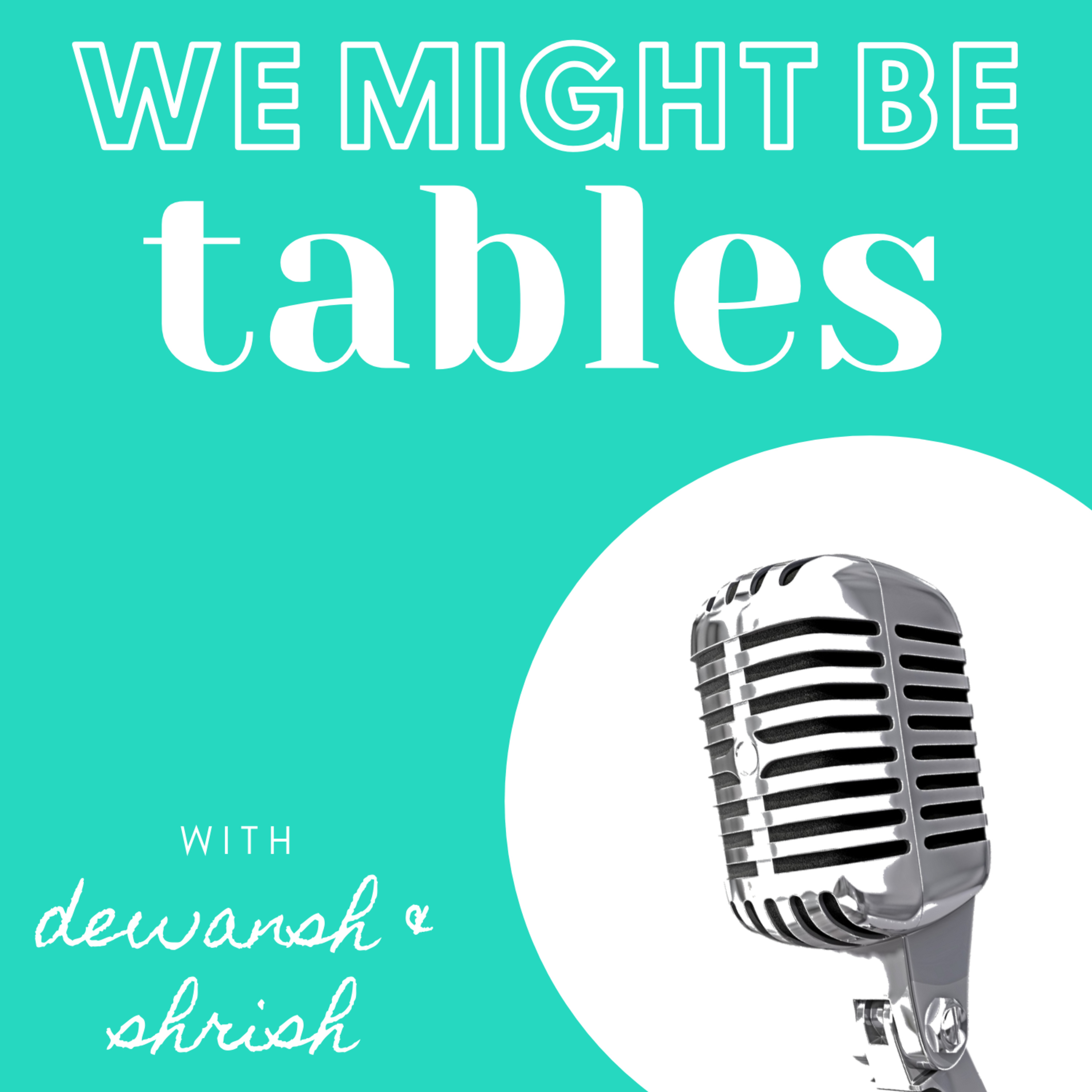
We Might Be TablesEpisode 13: The Glory of Misplaced Loyalty (Fear and Desire - Stanley Kubrick)To die for the nation or to spend a lifetime doing manual labour.What would you pick? Why?It's strange how easily we, as a society, get swept up in grand narratives of loyalty to the country and the justness of war. What is war? What is the nation? How does an abstract, social entity, such as the nation, come to be treated as a natural fact?Fear and Desire (1953) is Stanley Kubrick's disowned child. Interestingly, he spent the rest of his career trying (albeit unsuccessfully) to erase all copies of the movie, c...
2020-12-2757 min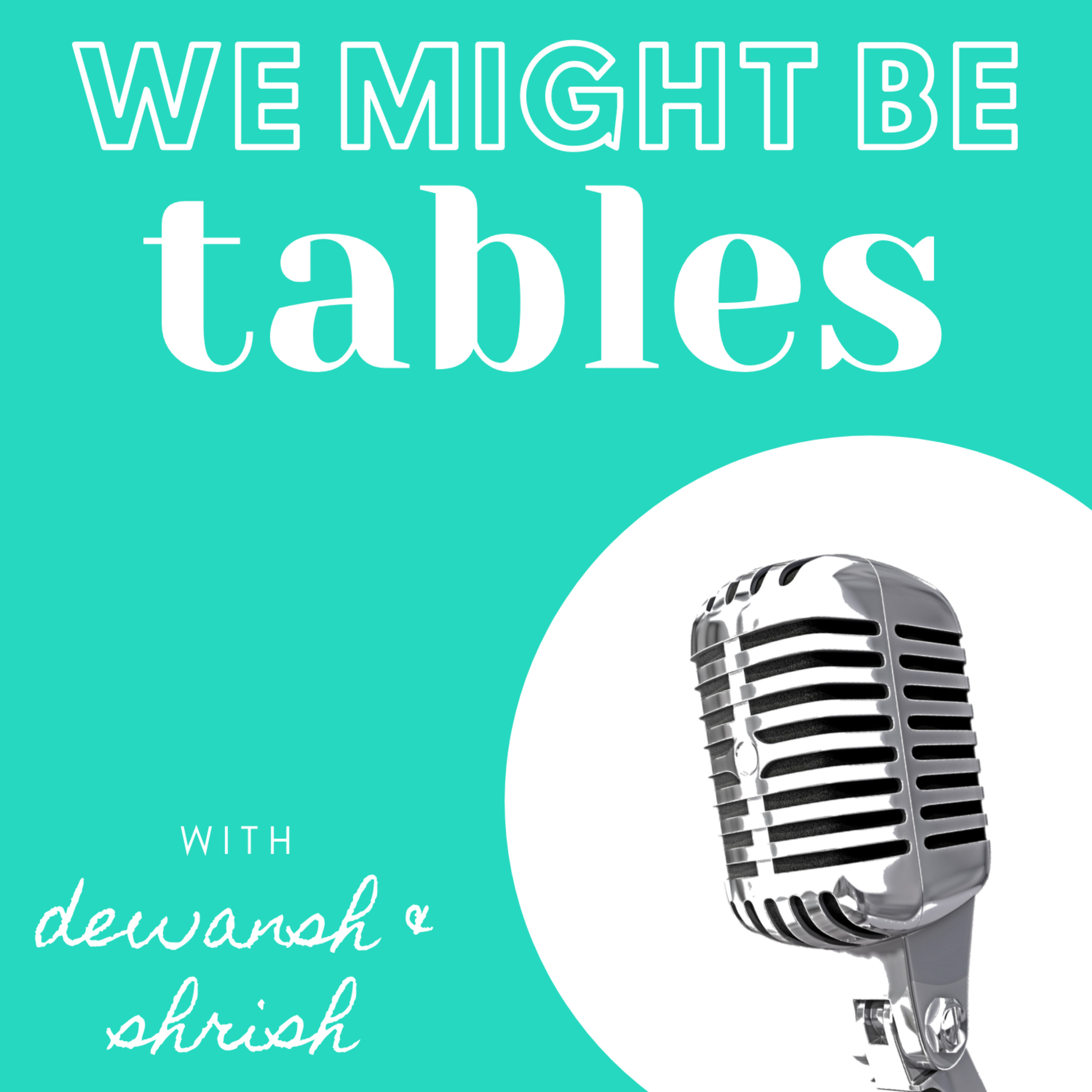
We Might Be TablesEpisode 12: WarIn 2016, the global average GDP was ~121 trillion USD. Healthcare constituted 6%, and military spending just about 1.5%. Here's the catch: one year earlier, the economic cost of violence and warfare was 13.5 trillion dollars, which was over 11% of global GDP. Could these 13.5 trillion dollars have been used in education and welfare?Let's sit with these figures for a minute.War. How do we define it? How do we begin thinking about it? It has a long and complicated cultural history, but we need to ask ourselves if it is entirely a cultural phenomenon.Could war ever...
2020-12-1359 min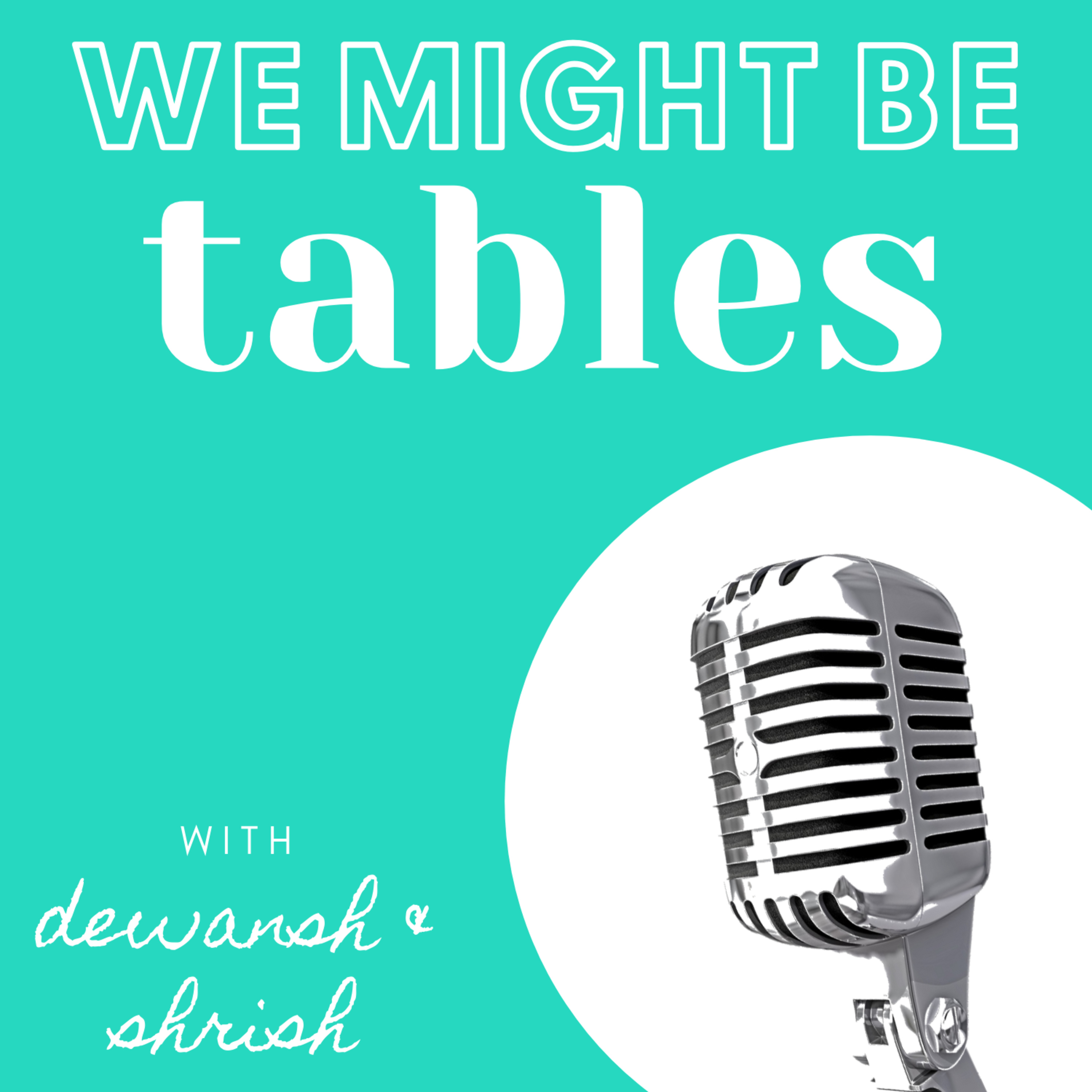
We Might Be TablesEpisode 11: Meat-ing the Demand Part II (With veganism on the rise, is meat cooked? - Peter Singer)Two years ago, Peter Singer predicted that meat might be exiting our diets. He reinforced the moral and environmental concerns that should worry us, and compel us to reconsider our dietary choices. Has much changed since then? Should the meat on our plates worry us now, more than ever? Would eliminating factory farms really make a difference? Most importantly, should everyone go vegan?Today, we pick up where we left off and explore the technological possibilities of ethical meat consumption. Join us as we wrap up our conversation about Peter Singer's insightful article. With veganism on the r...
2020-12-0636 min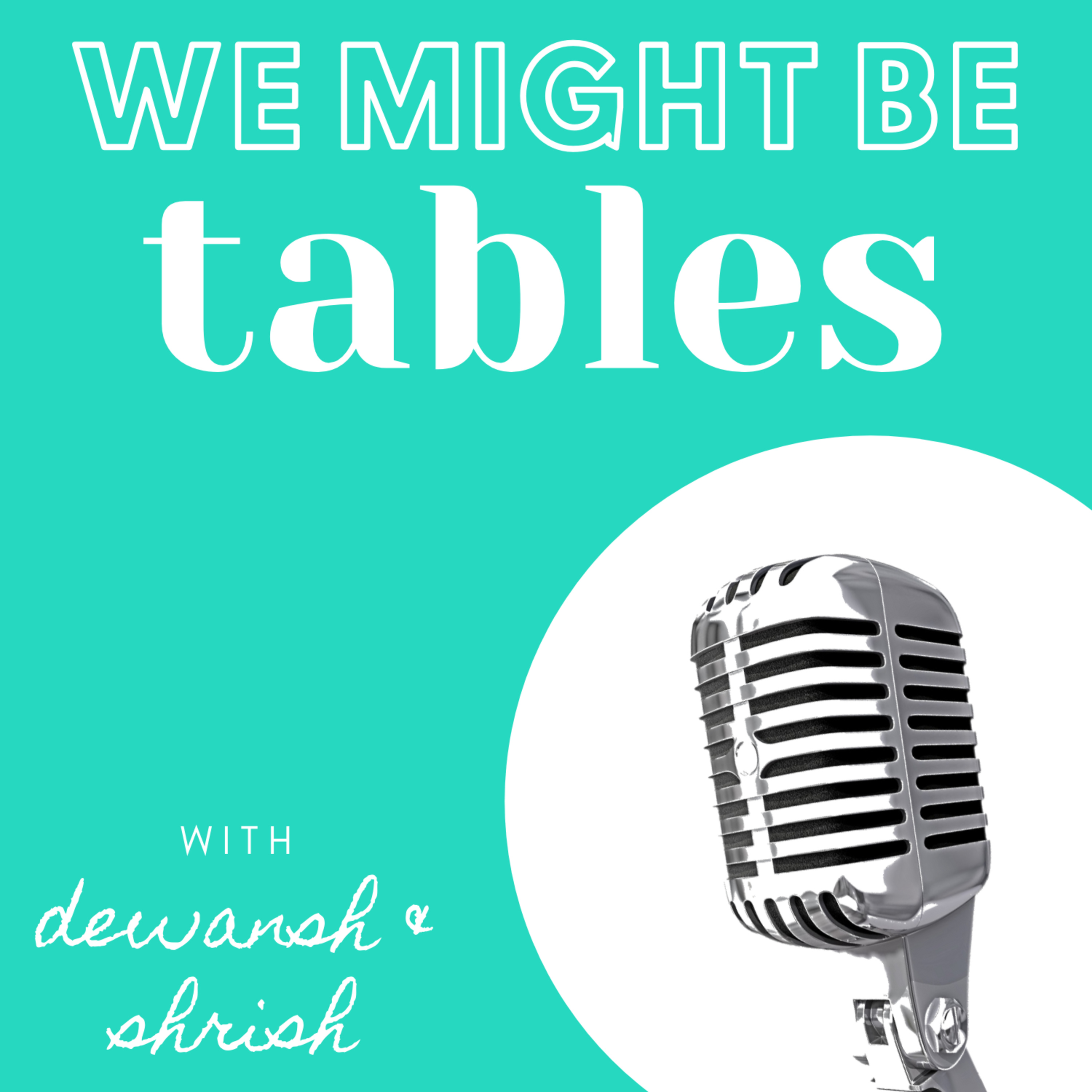
We Might Be TablesEpisode 10: Meat-ing the Demand Part I (With veganism on the rise, is meat cooked? - Peter Singer)Two years ago, Peter Singer predicted that meat might be exiting our diets. He reinforced the moral and environmental concerns that should worry us, and compel us to reconsider our dietary choices. Has much changed since then? Should the meat on our plates worry us now, more than ever? Would eliminating factory farms really make a difference? Most importantly, should everyone go vegan?We explore these questions and examine Singer's article closely in this episode.Mentioned in the episode:With veganism on the rise, is meat cooked?We are What We...
2020-11-2942 min
We Might Be TablesEpisode 9: Jusqu'ici tout va bien (La Haine - Mathieu Kassovitz)Mathieu Kassovitz's La Haine is as powerful as it is timeless. A deeply personal story about violence, youth, rebellion and, of course, hatred, it brings to life the struggles of being a minority community in one of the most politically charged places in the world.In this episode, we talk about all the elements that make Kassovitz's film a masterpiece of modern cinema, in both style and content. La Haine demands frequent revisitation; suffice it to say, it's quite the experience.Criterion - La haine and after: Arts, Politics, and the Banlieue: https://www.criterion...
2020-11-1547 min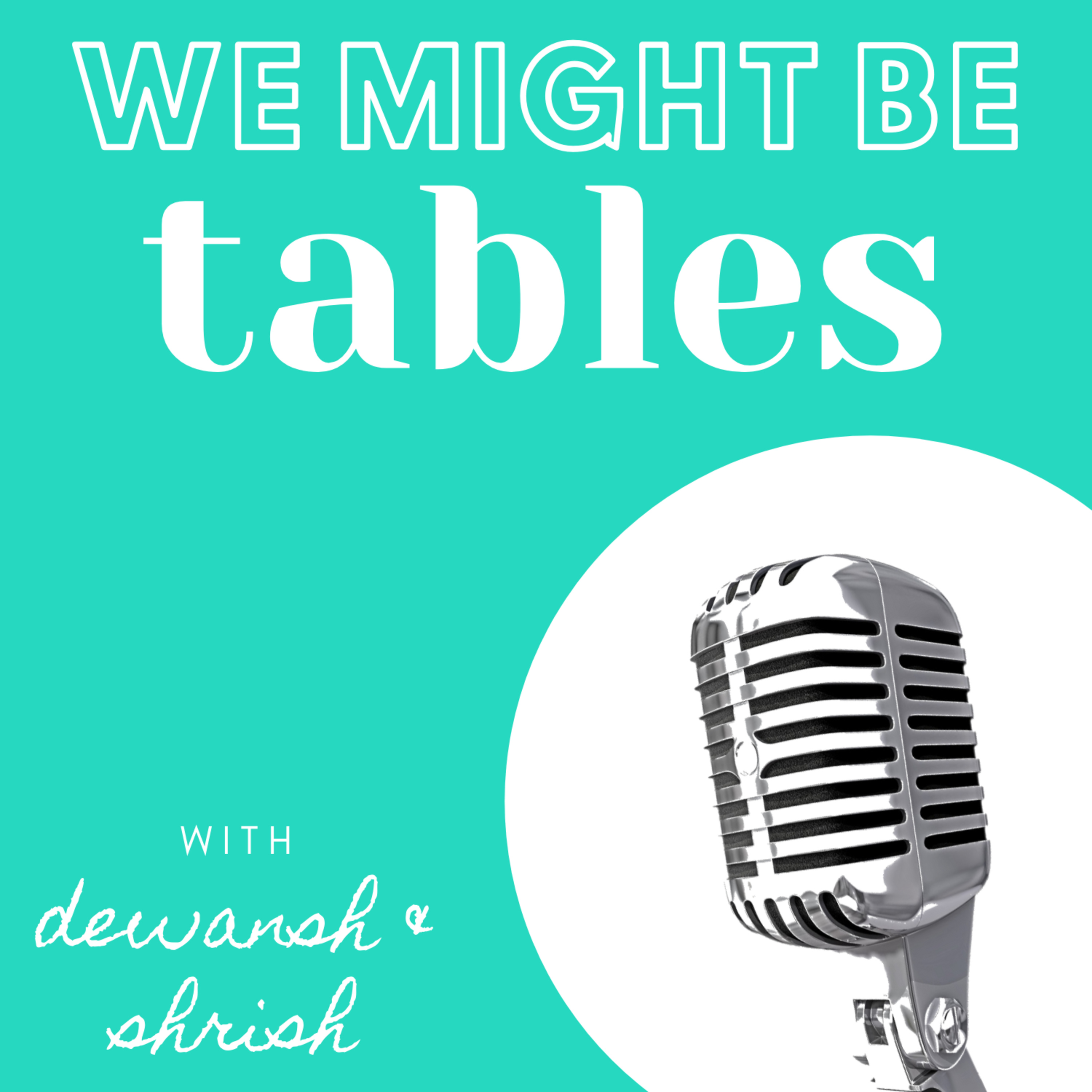
We Might Be TablesEpisode 8: Standing on the Shoulders of a Child (The Ones Who Walk Away from Omelas - Ursula K. Le Guin)The Ones Who Walk Away from Omelas is a powerful work of short-fiction that raises many questions about happiness, utilitarianism, and utopia. If the condition for an idyllic world to exist was that one child should be subjected to eternal torture, would you support that world? We'll do you one better: what if this child was you?In this episode, we discuss the nature and implications of Ursula K. Le Guin's acclaimed text, both for our current reality and the future.Veritasium: Is Success Luck or Hard Work?--- Send in a voice message...
2020-11-0151 min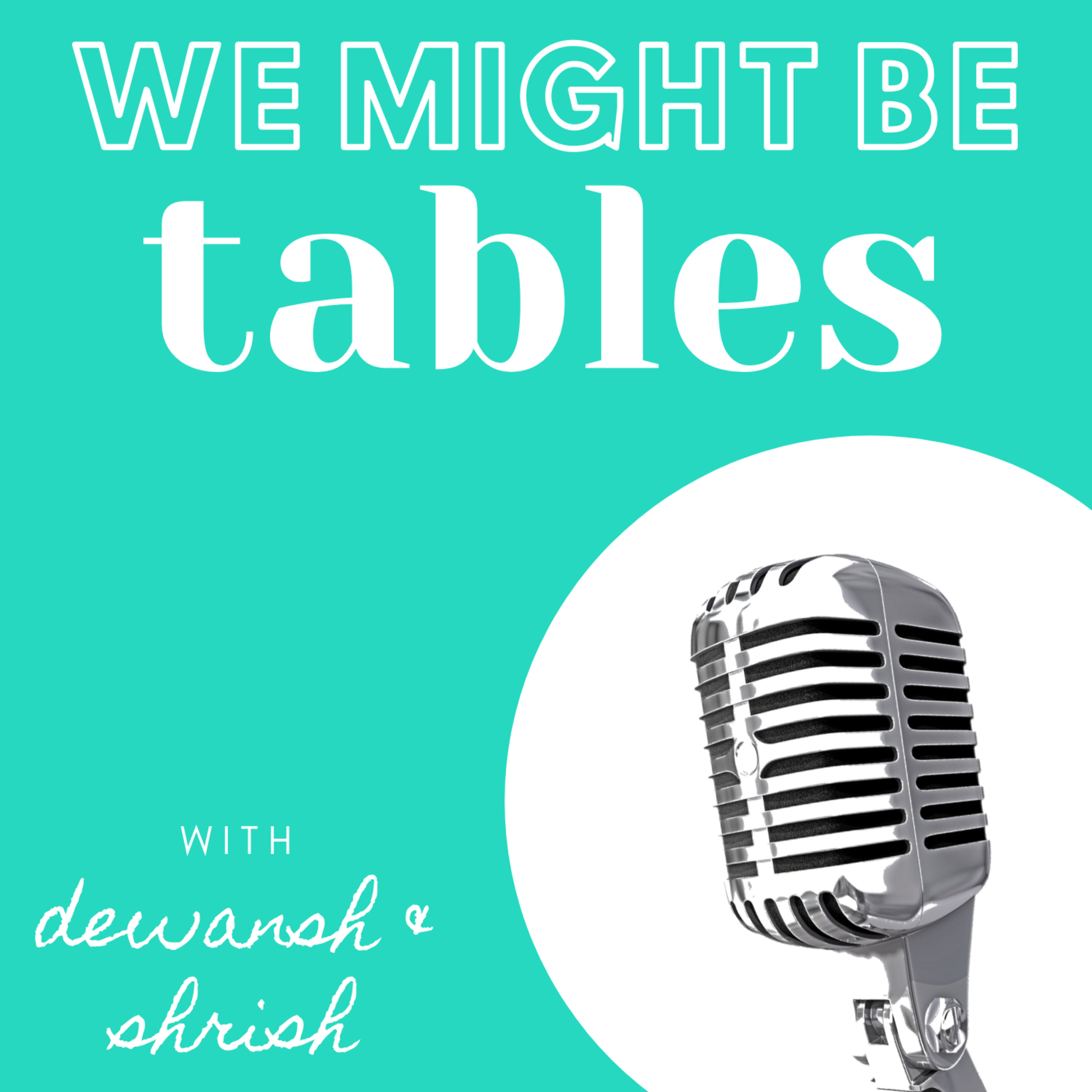
We Might Be TablesEpisode 7: A Human is By Nature a Digital Animal (The Social Dilemma - Jeff Orlowski)What if we told you your attention was all that mattered? Your complex, human existence is reduced to a qualitative judgement based on how much time you spend in front of a screen.In his latest documentary, Jeff Orlowski invites numerous ex-employees of the world's biggest social media companies, to reveal unpleasant truths about how the "eyeball-grabbing" business operates. How are we shaped by what we see, and how is it that people seem to have such drastically different opinions on the ethics of technology?In this episode, join us in breaking down everything addressed...
2020-10-081h 06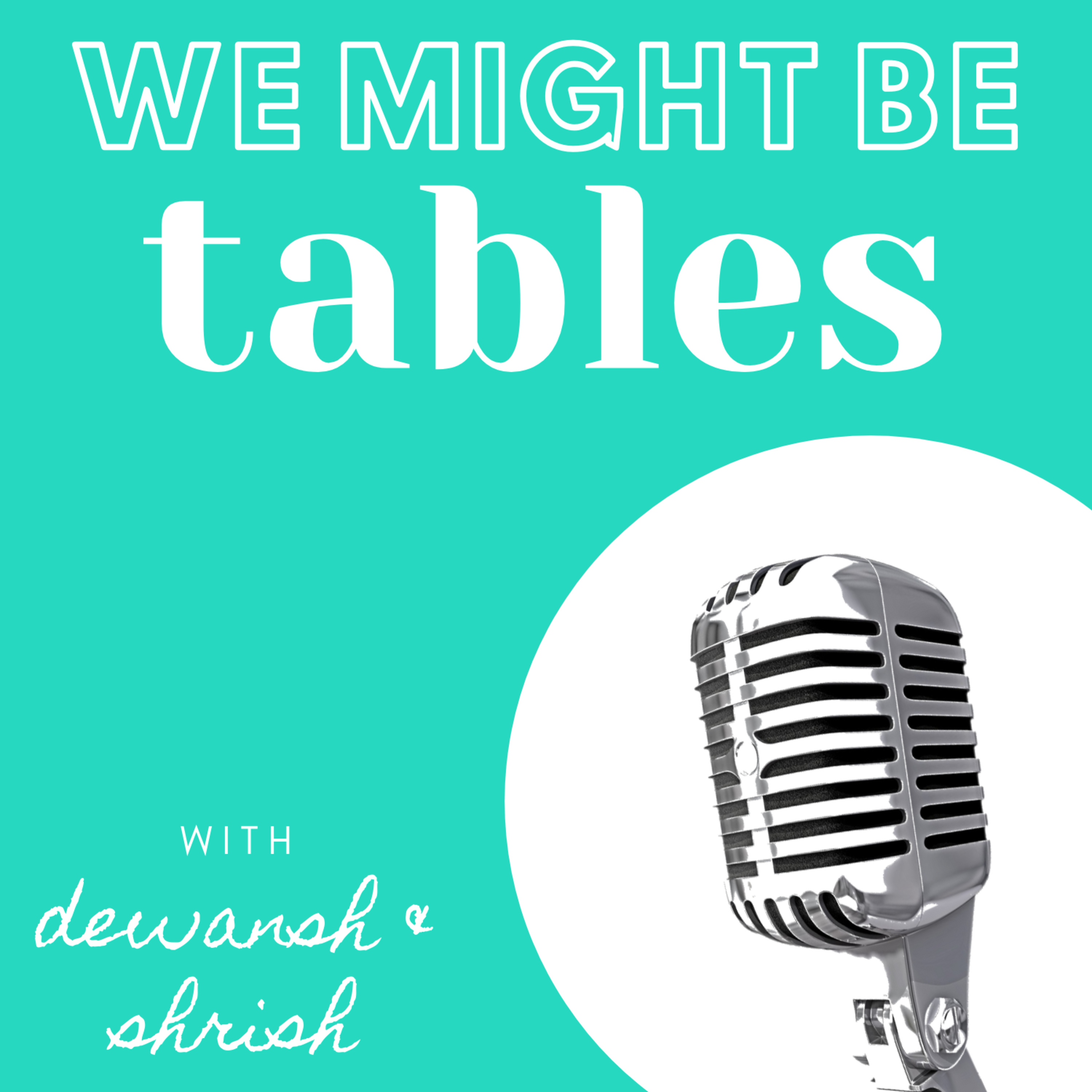
We Might Be TablesEpisode 6: Beyond the Fog (After Life - Hirokazu Koreeda)After Life, Hirokazu Koreeda, 1998.You have to pick one memory. Just one; and you stick with it for all of eternity. Would you be able to do it? Would you be able to pick a single memory to take with you forever? What if that's the only choice that lies beyond death? In this episode, we talk about how Koreeda's film, a meditation on eternity, impacted us. This is the first of many episodes addressing death and the limits of our knowledge about it.--- Send in a voice message: https://anchor.fm/we-might-be-tables/message
2020-10-0455 min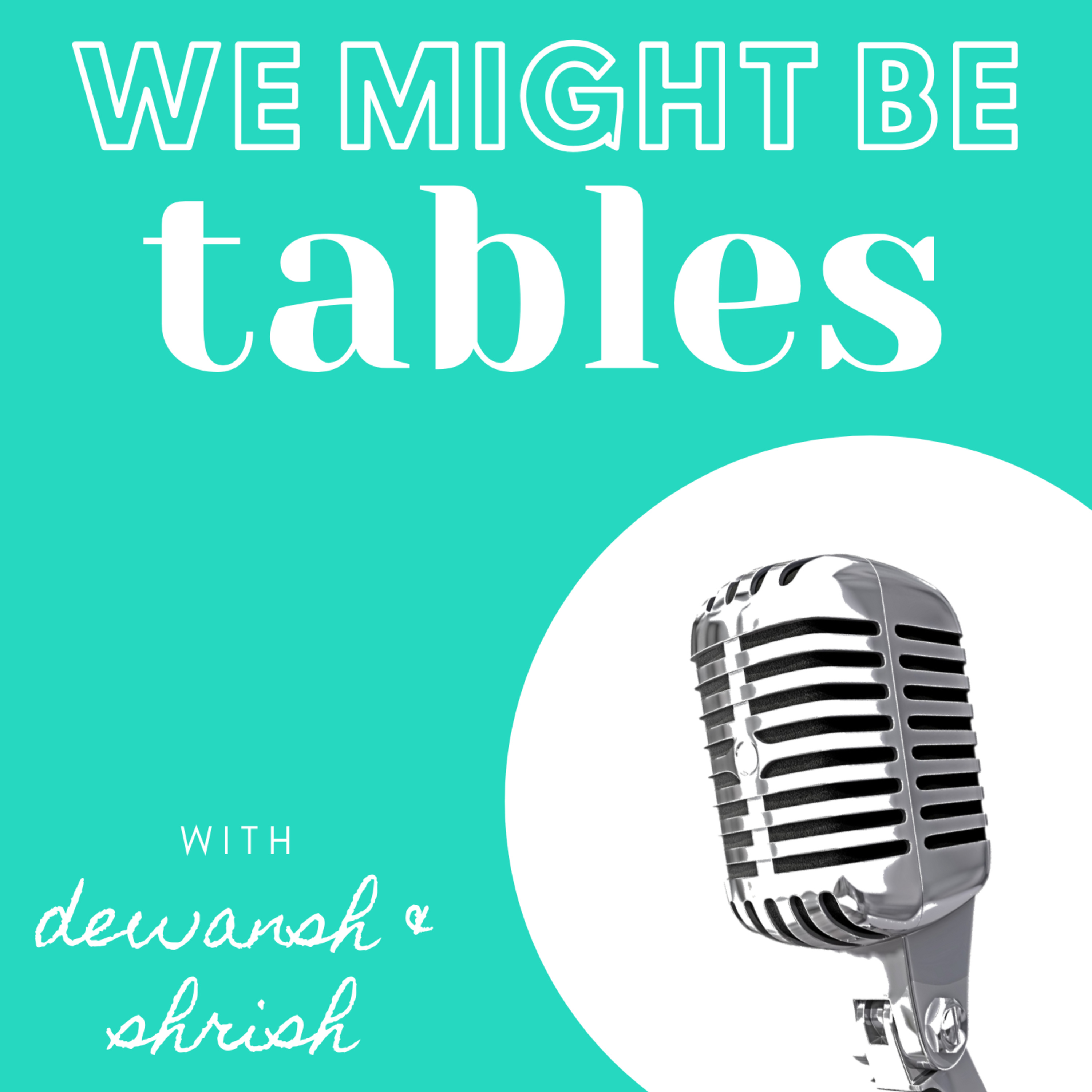
We Might Be TablesEpisode 5: The Empath's Dilemma II (Against Empathy - Paul Bloom)Last week, we analysed Paul Bloom's Against Empathy: its principal arguments and real-world applications. In this episode, we take a look at what experts from his own field think. Responses to the argument against a psychological pillar such as this one got us thinking as much as the main article itself, and it's sure to do the same to you. Finally, we present our views on the subject, and highlight cultural differences in understanding social behaviour.--- Send in a voice message: https://anchor.fm/we-might-be-tables/message
2020-09-2750 min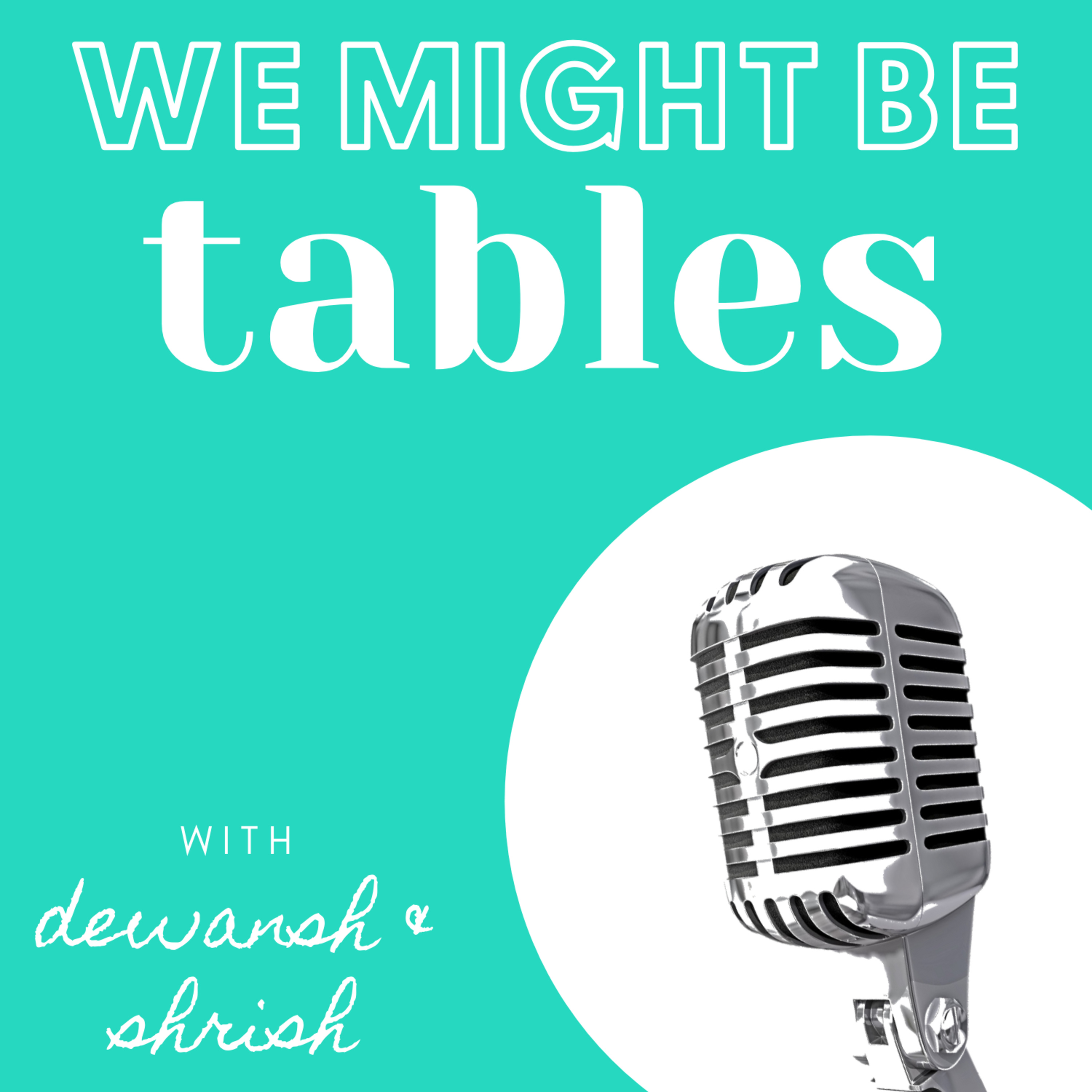
We Might Be TablesEpisode 4: The Empath's Dilemma I (Against Empathy - Paul Bloom)Are you against empathy? A cornerstone of prosocial behaviour, it is often taught as a "vital" component of human interaction. Paul Bloom disagrees. In a highly polarising article, the Yale University professor of psychology breaks down the popular conception of empathy, and advocates for the exercise of what he calls "compassion" instead. In this episode, we take a look at Bloom's arguments and analyse whether they do really call for a fundamental change in the way we look at emotion and behaviour. Additionally, we talk opinions and compare how cultural differences in understanding psychology contributed to our reading of the ar...
2020-09-201h 07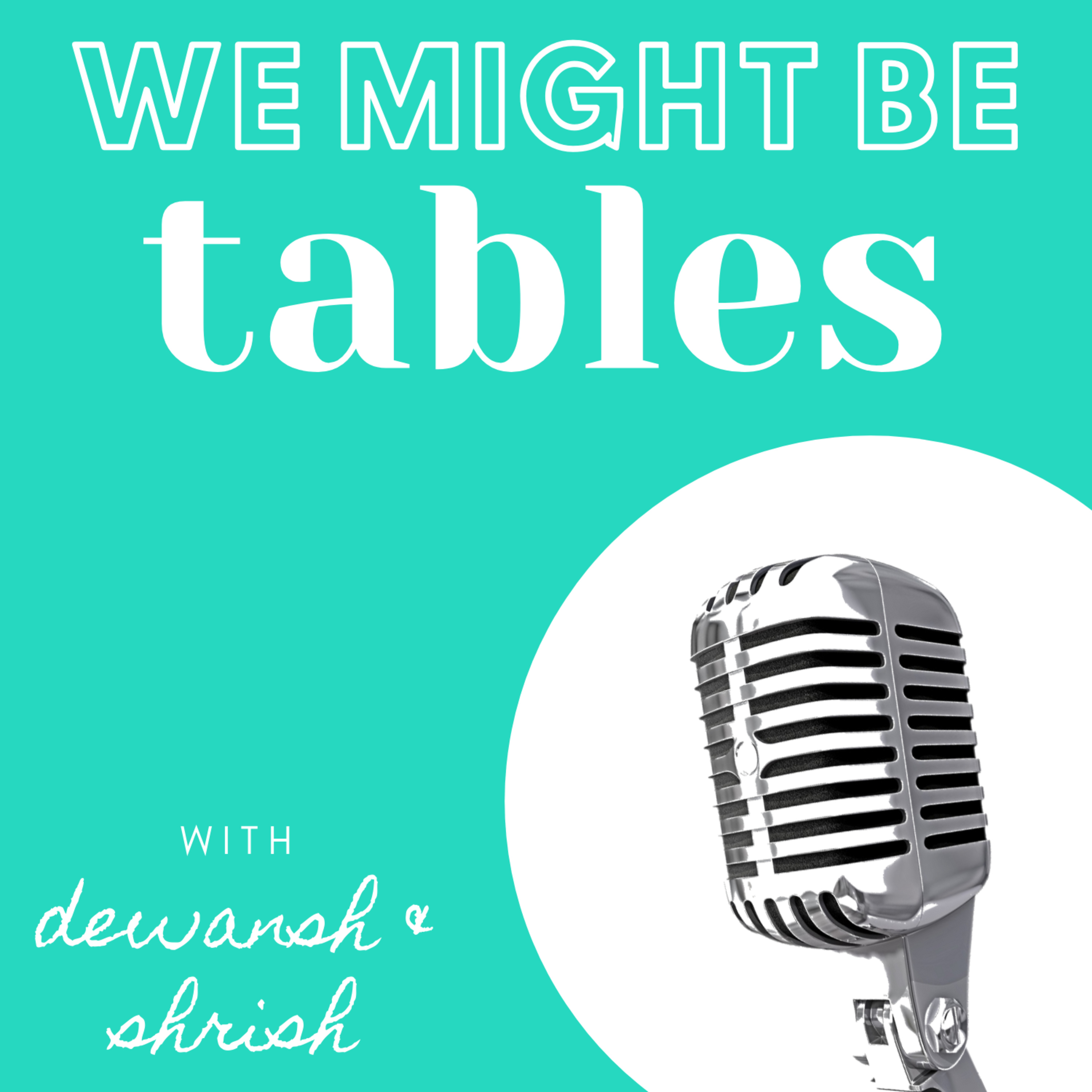
We Might Be TablesEpisode 3: Post Apocalyptic Musings II (The Last of Us Part II)In Part 2 of our series on The Last of Us, the conversation picks up where we left off last time, with questions of Joel's righteousness and what it would feel like to be Ellie. Today, we look at issues of representation, artistic freedom, and the the dilemma of "deriving satisfaction". Below are the links to articles and videos discussed in the episode:jacksepticeye: The Last of Us Part II (Gameplay Playlist)Game Theory: Joel's Choice Meant Nothing! (The Last of Us)The Last of Us WikiNathan Zed: The Last of Us 2...
2020-09-1332 min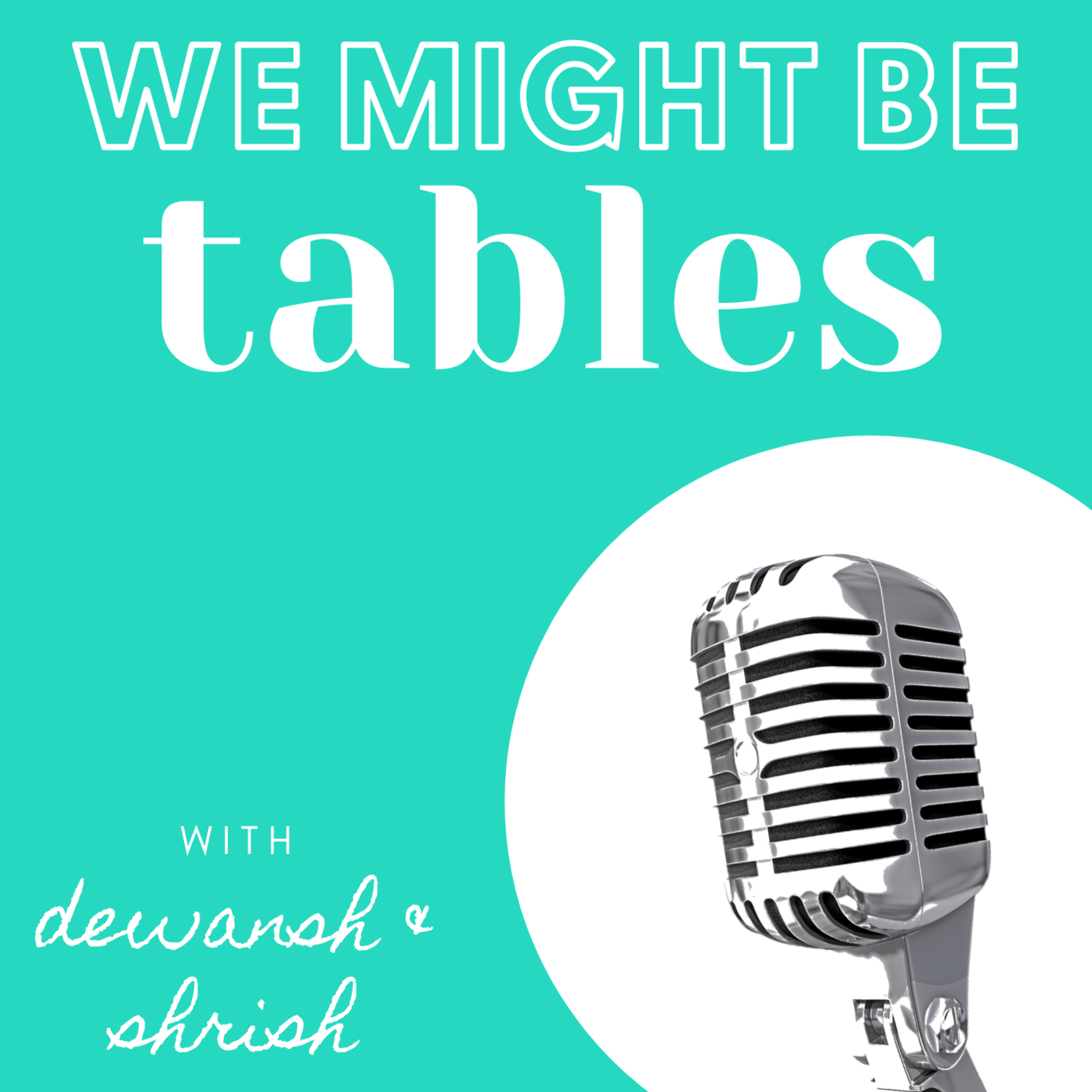
We Might Be TablesEpisode 2: Post Apocalyptic Musings I (The Last of Us Part II)In this episode, we take you through our thoughts on (and critique of) one of the most impactful video games of our generation. The Last Of Us Part II made us re-think the power of this medium and painted a morally ambiguous picture of a world strikingly similar to our own. Below are the links to articles and videos discussed in the episode:jacksepticeye: The Last of Us Part II (Gameplay Playlist)Game Theory: Joel's Choice Meant Nothing! (The Last of Us)The Last of Us WikiNathan Zed: The Last o...
2020-09-061h 15
We Might Be TablesEpisode 1: We Might Be TablesHey! So, you’ve made your way over to the first episode of We Might Be Tables. Welcome to the Introduction where we, Dewansh Matharoo and Shrish Sudharsan, take you through the journey of how this podcast came to fruition. We hope you enjoy our discussions about philosophy, life, and all things intriguing. We look forward to hearing from you and having you back for our future episodes! --- Send in a voice message: https://anchor.fm/we-might-be-tables/message
2020-08-3005 min